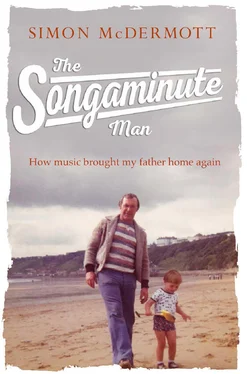Hilda still had no idea what was going on and shouted upstairs for Ted to come down and explain himself. Ted came down the stairs in just his trousers, put his bare feet into his shoes, calmly put on his jacket and walked past the two women stood on the step. ‘I dow wanna talk about it. I’m going,’ he said.
That was the last time Hilda and the family saw Ted for over three weeks. Everyone was distraught and worried – even Iris who told Hilda she hadn’t seen him but didn’t give the whole story about the row and the concerns she’d had before they split up. Then one Sunday dinnertime, Ted’s nan came over and told Hilda that he was safe with her. The whole road must have heard Hilda exhale with relief. ‘Just give him some time,’ she said.
The next day Hilda went over to Walsall to try and persuade Ted to come home, but as soon as he saw her coming up the path, he walked out the back of the house, too embarrassed to be seen like that by his mum.
Eventually, after a number of failed attempts, Hilda finally managed to persuade him to come home. She warned everyone back at Kent Road not to say a word about Iris to Ted and on the night of his return, while the rest of the family were sat in the front room, Ted opened the front door and went straight upstairs to bed without speaking to anyone. He stayed in his room for days. It was a low point for the whole house to see Ted in that state. His sister Jane says: ‘After a while he got over it, though – and that’s when he really started to enjoy his life.’
But no one really knew until years later how deeply the end of the relationship had affected Ted.
Chapter 4
On the face of it at least, things soon went back to normal for Ted. His National Service had ended after a lively eighteen months, and everyone was relieved to see him getting on with things. But what they didn’t glimpse lurking beneath the happy-go-lucky demeanour was discontent: Iris’s observations about Ted’s tendency to feel anxious were well founded. To Ted, everyone else seemed to have their lives sorted – jobs, partners and children, a clear life plan, but his structure had fallen away. He didn’t have the discipline of the Army, he didn’t have a house or a car or anything really; all he owned were his records. Ted wasn’t so much driven by making money or having material goods, his enjoyment in life came purely from making people happy – from entertaining and looking after everyone, which was unusual at a time when things were tough and the world was very much ‘every man for himself’.
The late 1950s and early 60s were a relatively prosperous time across the country, but nevertheless making ends meet was generally very hard for a lot of normal families. Ted still witnessed Maurice and Hilda watching every penny and he continued to make sure that any extra he had went into the household. Leaving the Army had been a blow for him, and returning to the factory, seeing all the old faces still there, plugging away to make ends meet, felt like taking a step backwards. His brothers and sisters were growing up and one by one leaving the family home. Life slipped back into a familiar pattern: the only thing missing was having Iris as his girlfriend.
That said, it was impossible for Ted to fully close the door on that relationship, mainly as Iris would still come round the house to see Hilda. The two women had formed a strong bond and neither was ready to cut the other off completely, despite the break-up. Ted tried to take this in his stride and was relieved that these visits would often take place before he finished work. However, there was the odd occasion when Iris’s perfectly timed exit didn’t quite pan out. It all came to a head about a year or so after the couple had split up and Ted came in from work to find Iris still there. He went into the kitchen to put the kettle on, as he did every night he came home, and handed everyone a mug of steaming tea, everyone except Iris.
‘Where’s mine?’ she asked.
‘In the kettle. You can make your own,’ he replied.
The hurt between Ted and Iris still ran deep in him, so he clutched on to a new daily routine to bring him order and structure. He wasn’t remotely interested in finding a new girlfriend and instead started spending time with his brothers – down at the club and out and about. His brother John remembers: ‘After he came out of the Army, Ted would spend hours polishing his shoes – so much so that you could see your face in them. If I was going somewhere with the school, he’d show me how to tie my tie. He’d say, “Come here, you. You ay going out like that. I’ll show you how to do a tie,” and he’d sit there and show you how to do it.’
Friday night was the real performance though – everything had to be absolutely perfect and even his handkerchief would be pressed and placed across the top of his jacket pocket in a neat line.
Before he went out, Ted would make sure that Hilda had given him the once-over: ‘What do you think of this, Muv?’
‘Looks alright, Ted,’ she would reply.
Then he’d head back upstairs to finish getting ready. A few minutes later he’d be back in the kitchen with the handkerchief refolded in a different style – this time with three points to it.
‘You think this one looks better?’ he’d ask.
‘Well, yeah, it’s alright,’ Hilda would say, not really paying attention.
This performance would usually repeat itself until Maurice looked up from his newspaper and bellowed: ‘FOR CHRIST’S SAKES, it’s a bloody handkerchief!’ But in spite of this, he was delighted to see his son looking the part. He’d watch Ted walk out of the front door and up the path with quiet delight, often turning to his wife and saying: ‘Look at him, our Hild. He walks down that street thinking he’s a bloody millionaire! He might not have a penny in his pocket but he’s singing and whistling to himself like he hasn’t got a care in the world.’
A well-turned out appearance became one of Ted’s defining features. His quest for the perfect ‘look’ often meant that if he didn’t have the outfit he wanted, he would simply borrow from his brothers in order to create the right ensemble. His brother Colin was the usual target: ‘I remember one time I’d just got paid and bought myself a new top from Burton’s one Saturday. I’d come home, “had my tea and then Ted goes, “Col, can you lend me half a quid?” I said, I can, but yam gotta start looking after your money a bit better, our Big.” Anyway, me and Micky Felton went up the Adelphi and then afterwards we popped into the Star and Garter for a drink. Who was sitting at the bloody bar? Our Ted, smoking a little cigar with half a Guinness … and wearing my bloody new top. I didn’t say anything and asked him if he wanted a drink. The next day I asked our mum, “Did Big have my new top on last night?” “No,” she’d say, and would always cover up for him. He could do no harm in her eyes!’
In fact, Hilda was happy to aid and abet when it came to Ted ‘borrowing’ his brother’s clothes – if he wore one of Colin’s suits the next day, she would brush it down and hang it on the line to air it out.
Despite being a regular at The Cora and the many other pubs in Wednesbury, Ted would hardly drink. ‘You could buy him half a shandy and you’d be pressed to see if it had gone down by half an inch by the end of the night,’ says John. ‘On the nights that he was singing, he’d have a glass of tea – everyone used to think that he’d be drinking neat whisky. That’s what kept him so fit.’
Despite the banter about Ted’s love of the finer things in life, family loyalty was everything for the McDermotts, and Ted led the way in making sure they weren’t disrespected. He had a bit of clout locally – a good job at the factory, a successful Army record and a great voice that dominated the local clubs. A few years after coming back from the Army, he continued this tradition while defending his niece, Lorraine. She was the daughter of his brother, Fred, and his wife, Edna. From a young age, Lorraine had suffered with a slow eye, which meant she had to wear a big patch over her glasses to correct it. One day she went to play at a friend’s house – it was the Spooner family and they had lived on the same street as the McDermotts since Ted was a boy. All the children had grown up together, playing out and getting into all sorts of scrapes, and their parents went to The Cora together on a Friday night.
Читать дальше












